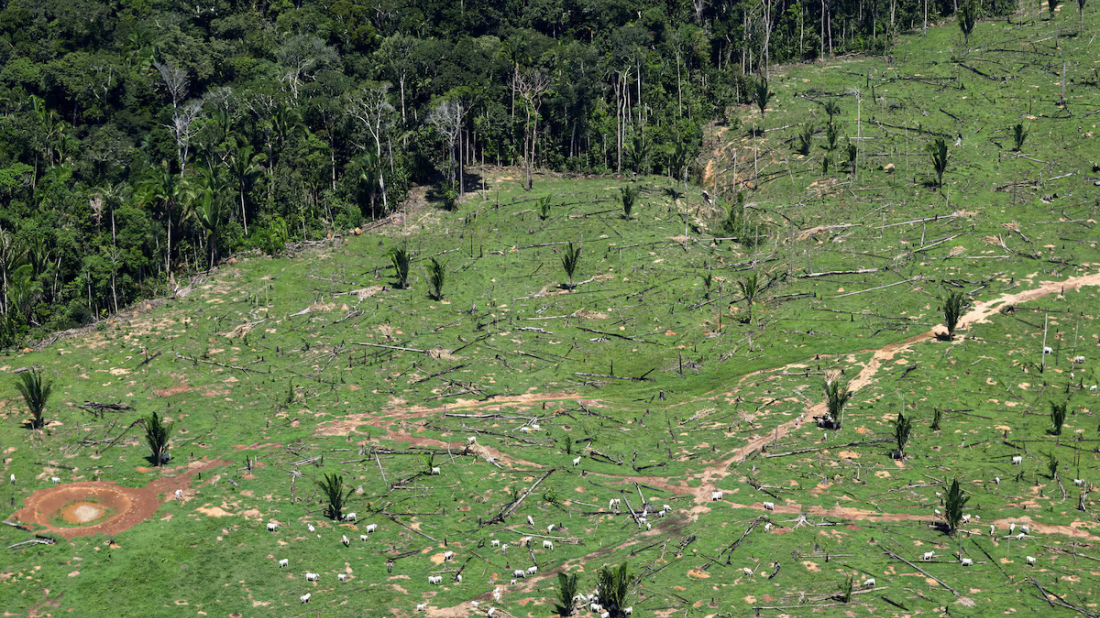live Israeli military says it has launched fresh strikes on Tehran and Beirut: All the latest news on the Iran strikes
The Israeli military has begun a new wave of strikes on Tehran, it said late on Monday. The strikes came after it issued...

Global investors managing more than $3 trillion in assets have urged governments to halt and reverse deforestation and ecosystem destruction by 2030, according to a joint statement released on Monday ahead of next month’s U.N. climate conference in Brazil.
Around 30 major institutional investors, including Swiss private bank Pictet Group and Nordic firm DNB Asset Management have so far endorsed the Belém Investor Statement on Rainforests, which will remain open for additional signatories until 1 November.
A recent report found that the world remains far from achieving its goal of stopping deforestation, with 8.1 million hectares (20 million acres) of forest, an area roughly the size of England lost in 2024 alone, largely due to agricultural expansion and wildfires.
“As investors, we are increasingly concerned about the significant financial risks that tropical deforestation and nature loss pose to our portfolios,” the statement said.
The signatories called for stronger legal, regulatory, and financial frameworks to protect forests and ensure economic stability. Jan Erik Saugestad, CEO of Nordic investment firm Storebrand Asset Management, said that “deforestation undermines the natural systems that global markets depend on, from climate regulation to food and water security.”
Earlier this year, the European Union postponed implementation of its anti-deforestation law by one year following opposition from industry groups and trade partners such as Brazil, Indonesia, and the United States, who argued that the rules would be costly and harm exports to Europe.
Ingrid Tungen, head of deforestation-free markets at the Rainforest Foundation Norway, said that the stance of U.S. President Donald Trump, a known climate sceptic had weakened global environmental efforts.
“I think Trump has made it more difficult for investors and fund managers to take climate and biodiversity into account in such a volatile market,” she said. “Every investor we speak to believes that failing to address deforestation and climate change poses enormous long-term risks, not only from an ethical perspective but because it directly threatens market stability and profitability.”
Follow the latest developments and global reaction after the U.S. and Israel launched “major combat operations” in Iran, prompting retaliation from Tehran.
The Kremlin is utilising the recent United States and Israeli military strikes on Iran to validate its ongoing war in Ukraine. Russian officials are pointing to the escalation in the Middle East as evidence that Western nations do not adhere to international rules.
Saudi Arabia’s state oil giant Saudi Aramco closed its Ras Tanura refinery on Monday following an Iranian drone strike, an industry source told Reuters as Tehran retaliated across the Gulf after a U.S.-Israeli attack on Iranian targets over the weekend.
The Middle East crisis intensifies after the deadly attack on the compound of the Supreme Leader of Iran Ali Khamenei on Saturday that killed him, other family members and senior figures. Iran has launched retaliatory strikes on U.S. targets in the region.
Ayatollah Alireza Arafi has moved into a pivotal constitutional role following the death of Supreme Leader Ayatollah Ali Khamenei, becoming the clerical member of Iran’s temporary leadership council under Article 111 of the Constitution of the Islamic Republic of Iran.
The death toll from heavy rains and flooding in Brazil’s Minas Gerais state has risen to 46, authorities said, with 21 people still reported missing. The storms triggered landslides and widespread flooding, displacing thousands across Juiz de Fora and Uba.
The administration of U.S. President Donald Trump on Thursday (12 February) announced the repeal of a scientific finding that greenhouse gas emissions endanger human health, and eliminated federal tailpipe emissions standards for cars and trucks.
Tropical Cyclone Gezani has killed at least 31 people and left four others missing after tearing through eastern Madagascar, the government said on Wednesday, with the island nation’s second-largest city bearing the brunt of the destruction.
Rivers and reservoirs across Spain and Portugal were on the verge of overflowing on Wednesday as a new weather front pounded the Iberian peninsula, compounding damage from last week's Storm Kristin.
Morocco has evacuated more than 100,000 people from four provinces after heavy rainfall triggered flash floods across several northern regions, the Interior Ministry said on Wednesday.
You can download the AnewZ application from Play Store and the App Store.

What is your opinion on this topic?
Leave the first comment